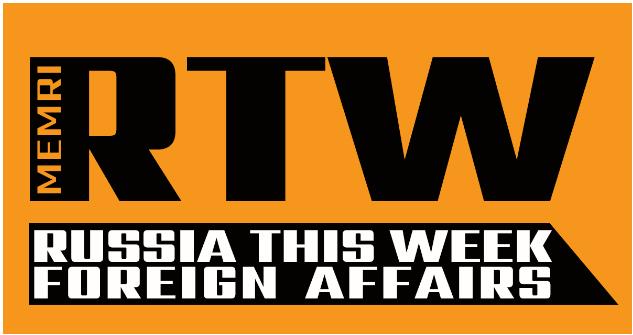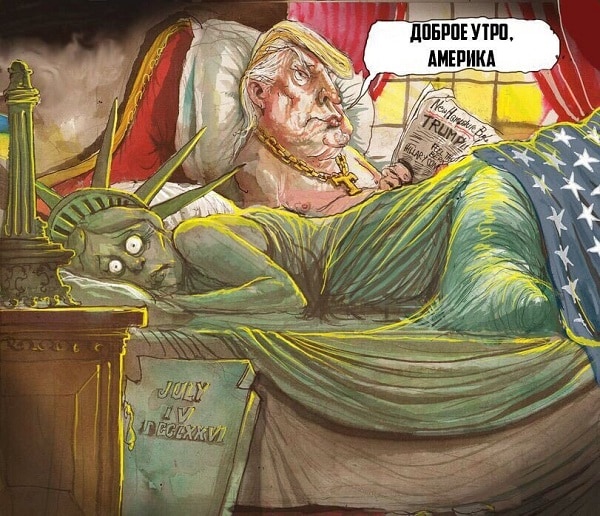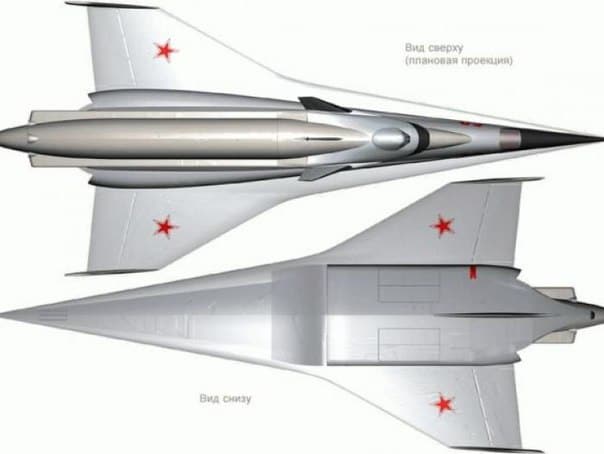Russia This Week is a weekly review by the MEMRI Russian Media Studies Project, covering the latest Russia-related news and analysis from media in Russia, the Caucasus, Central Asia, and Eastern Europe.

Cartoon Of The Week

(Source: Twitter.com/sharzhipero, November 11)
Trump: "Good morning America."
Zakharova Dixit
Russian Foreign Ministry spokesperson Maria Zakharova is one of the most-quoted Russian officials. She is known for using colorful language when describing Russian foreign policy in her weekly press briefings. The following are Zakharova's quotes of the week:

Zakharova meets with Austrian Foreign Minister Sebastian Kurz, who will chair the OSCE starting from 2017 when Austria takes over the OSCE presidency from Germany. (Source: Instagram.com/mzakharovamid)

Zakharova wrote: "Kurz. Sebastian Kurz. Austrian Foreign Minister. OK."
On her Facebook page, Zakharova wrote: "Seriously speaking, we don't expect friendship, brotherhood and justice to prevail once the new team is formed. We have no illusions. An individual should distinguish a biased anti-Russian campaign from standing up for your national interests. Such campaigns may inflict damage, though not as much on Russia, as it would on the rest of the world since the world needs balance. Meanwhile, protecting one's national interests is a normal working process, though it may have various drawbacks."
(Tass.com, December 8)
During her weekly briefing Zakharova said:
"Regrettably, at the initiative of the outgoing Obama administration, which recently scared Americans with Russian hackers, Washington continues its anti-Russian hysteria, which has been going on for a few years now, and which is becoming increasingly reminiscent of something that seems straight out of an already forgotten age, the witch hunts.
"The current US Congress, which, as you may be aware, is also on its way out, is pushing ahead with a bill to form a special interdepartmental commission to develop a strategy to counter 'covert Russian influence'. The lower house has already voted for it. As follows from the text of the draft law, they accuse us not only of financing lobby groups, media manipulation and fomenting, but even contract killings and terrorist acts.
"Clearly, we are dealing with yet another case of clinical Russophobia, which originated in and was subsequently cultivated by the White House. This is not something new. It seems like something from a forgotten age. However, it turns out that Washington hasn't forgotten. I would like to remind you that during the Cold War, in 1981, they created a similar interdepartmental working group for active measures against the Soviet Union. They haven't come up with anything new this time. There wasn't even an attempt to introduce innovations into these processes. All they do is copy the Cold War. The group, which was created in 1981, focused on ideological confrontation with the Soviet Union. Its work culminated in publishing a brochure on Soviet military power, which addressed a wide global audience. Now, the same is being done in modern circumstances.
"This is not all there is to it. Our colleagues plan to go even further. In addition to anti-Russian propaganda, the draft provides for measures aimed at thwarting the activities of Russian diplomats in the United States. As you may be aware, most of them are not allowed to go beyond 40 km from their respective diplomatic missions. In order to leave the designated area, they are asked to notify the State Department first. I just wanted to clarify this, as I was in the same situation. Given a very busy work schedule (as you are aware, international developments in recent years have made the work Russian diplomats an almost round-the-clock activity), it is very difficult to make even medium-term travel plans. Therefore, the inability to travel beyond 40 km without notice, which requires a certain amount of time to file, as it should be filed several days before the planned trip, significantly complicates their work. Now, they plan to deprive Russian diplomats of even that possibility.
If the current US authorities are likewise willing to restrict the movement of their own representatives in Russia, they should keep in mind that everything is based on the principle of reciprocity in diplomacy. Simply put, US diplomats in Russia will be treated similarly. Once again, we are forced to respond. But each and every time we point out that it is not our choice. We stand for cooperation on bilateral issues and international affairs. Why Washington is doing this is anyone's guess."
(Mid.ru, December 7)
Quotes Of The Week
During a conference of the Russian International Studies Association entitled "Twenty-five years of Russia's foreign policy", Deputy Foreign Minister, Sergey Ryabkov said: "If some time ago the West wanted to see us in some clubs and private groups, that was only in the capacity of a junior partner who lost the Cold War and was therefore doomed to taking a subordinate role… Whatever historical trials Russia had to go through, paying such a price for joining the club for the select few has never been acceptable to us."
SUPPORT OUR WORK

Ryabkov then added: "We were threatened with another confrontation and another Cold War in the years following the romantic period of the late 1990s and quite recently, in the wake of developments in Crimea and Ukraine… However, we were not frightened and have been able to stand up for our interests, and this can hardly be questioned." Ryabkov also emphasized: "However, confrontation is not our choice and not our path. Nor is another extreme approach, namely, self-isolation with a view to saving strength for domestic development… In today's world, seclusion and self-isolation is basically a problem, and for a country like Russia, with its vast territory, (isolation) is simply impossible. That would contradict our own interests as well. All Russia's historical traditions show that our country is highly sought after in the international arena as an independent player… Our potential and ability to play a constructive role in global politics are significant, and we will use them actively."
(Tass.com, December 8)

Sergey Ryabkov (Source: Russianembassy.org)
Tweet Of The Week:
Commenting on accusations that Russia interfered in U.S. elections, Senator Alexey Pushkov (@Alexey_Pushkov) wrote on his Twitter account: "Trump was the choice of the Americans. To engage in witch-hunting &Russia-bashing is not an answer to the complex issues US & Russia are facing."

(Twitter.com/Alexey_Pushkov, December 11)
In The News:
UNSC Ceasefire Resolution
On December 5, Russia and China have vetoed a UN Security Council (UNSC) resolution on an immediate seven-day ceasefire in Aleppo. The Russian Foreign Minister described the draft resolution as counterproductive to a practical outcome: "In the light of today's consideration of a draft resolution on Syria by the UN Security Council, we are compelled to express bewilderment and indignation at Paris and London's ongoing propaganda campaign in connection with their alleged concern over the continued fighting in eastern Aleppo, the safety of civilians and the delivery of emergency humanitarian aid.
"Our 'concerned' French and British colleagues surely know that Aleppo residents are already receiving such aid – not just on paper but in fact – from Russia, through the Defense Ministry, the Hmeymim Centre for Reconciliation of the Opposing Sides and the Russian Emergencies Ministry.
"Increased calls from a number of Western capitals to stop the anti-terrorist operation in eastern Aleppo look more like a last, desperate attempt to exculpate and save backed by them terrorists and extremists who are headed for defeat, i.e. those who will stop at nothing to achieve their nefarious ends. It is they who continue to use civilians as human shields, and bombard and mine civilian infrastructure and humanitarian corridors.
"On December 5, as a result of a direct hit by a terrorist mine at the emergency department of the Russian mobile military hospital in Aleppo, a Russian female medic was killed. Two other medical workers were seriously injured, and one of them later died. Local residents who had come to see a doctor were also injured. However, Western capitals have not condemned this incident. We call on our partners to abandon their politicized approach and join the efforts to suppress the terrorist threat in Syria and search for a political solution to the Syrian crisis, instead of engaging in destructive emotional reactions through the media"
(Mid.ru, December 5)
The Russian Ministry of Foreign Affairs explained why Russia vetoed the resolution in the UNSC as follows:
"Developing the agreements reached by Foreign Minister Sergey Lavrov and US Secretary of State John Kerry in Rome on December 2, Russian and US experts should start, at the US proposal, to work on the East Aleppo problem. This work should be aimed at complete withdrawal of all militants from the eastern part of the city, as Russia has suggested for a long time. The sides will also have to coordinate the routes and time for the complete withdrawal of all militants. Once this is done a ceasefire will be announced with a view to their evacuation.
"In this way the problem of East Aleppo may be effectively resolved, the security of civilians and smooth humanitarian supplies ensured and life in the city normalized. Under the circumstances the intention of a number of UN Security Council members to put to a vote in the council a draft resolution on the humanitarian situation in Aleppo is a provocation that is undermining Russian-US efforts. The draft suggests an immediate ceasefire rather than the withdrawal of all militants. Moreover, militants in East Aleppo are given 10 days to decide whether to be part of the armistice or not. No doubt, the militants will use this generous break that the co-authors of the draft are ready to give them to regroup and build up their forces and arms, as they have done in the past. It would slow down the liberation of East Aleppo from the militants and prolong the suffering of civilians. Under the current circumstances, this draft is counterproductive. If those who are primarily concerned about escalating tensions in the media nonetheless decide to put it to a vote, we will proceed from the premise that it cannot be useful and contradicts the approaches that Moscow and Washington are coordinating."
(Mid.ru, December 5)
Lavrov's Meeting With Moldovan Deputy Prime Minister And Minister of Foreign Affairs And European Integration Andrei Galbur
On December 8, Russian Foreign Minister Sergey Lavrov met in Hamburg, on the sidelines of the OCSE Ministerial Council, with the Deputy Prime Minister and Minister of Foreign Affairs and European Integration of the Republic of Moldova Andrei Galbur.
The ministers discussed important aspects of cooperation between the two countries and interdepartmental cooperation in foreign policy matters. Special attention was paid to the current status of talks on the Transdnestrian settlement. Transdniester held presidential elections on December 11.
(Mid.ru, December 8)
Elections In Macedonia
On December 11, Macedonia held parliamentary elections. The Serbian political analyst and director of the Belgrade-based Foundation SEAS, Vencislav Bujić, said that when Russian Deputy Prime Minister Dmitry Rogozin visited Serbia in early 2016, and met with Serbian Radical Party leader Vojislav Šešelj, he directly declared that momentarily, Montenegro and Macedonia were the Kremlin's main Balkan priorities. For this reason, the Serbian Radicals would have to wait for Russian financial support a little longer. "I know it directly from people close to Šešelj," Bujić explained Russia's logic: "I understand why he specified these two targets. Montenegro is about to join NATO, and Macedonia sits right in the way of the Turkish Stream – a gas pipeline that Russia participates in building. Of course, Putin and his entourage do not want it to pass through the territory of countries that are in the sphere of influence of the West."
At the same time, according to the Serbian expert, pro-Russian sentiments in Montenegro and especially in Macedonia are not that widespread. Bujić said: "About 30% of the population are still against separating Montenegro from Serbia, joining NATO, etc. There are a lot fewer such people in Macedonia, but they have other tensions. About one third of the population are Albanians, others are Slavic peoples: Macedonians, Serbs, Bulgarians, etc. There is a risk that Russia may try to stir up an ethnic conflict between Macedonians and Albanians."
(Ru.krymr.com, November 3)

Elections in Macedonia. (Source: Balkaninsight.com)
New Montenegrin PM
On November 28, Dusko Markovic was nominated as the new Prime Minister of Montenegro. Markovic said that his government will try to complete the country's accession to NATO and "overcome misunderstandings in relations with its historical ally Russia." During her weekly briefing, Zakharova said: "We are open to constructive dialogue with all countries, including Montenegro. We'd like to hope that our bilateral relations that are going through a difficult phase through no fault of ours will be based on mutual respect and trust. We expect Podgorica to adopt a balanced approach and take practical steps to address the sources of the negative trend in bilateral relations."
It is worth noting that on October 16, 2016, Montenegro held its parliamentary elections, in which the Democratic Party of Socialists (DPS) scored another victory, albeit a slim one, winning 36 seats outs of 81. On the day of the elections, the former commander of the Serbian Gendarmerie, Bratislav Dikic, was arrested and accused of plotting a coup, that would involve killing civilians and murdering Montenegrin PM Milo Djukanovic, as well as temporarily shutting-down of the WhatsApp and Viber messaging apps.
(Sputniknews.com, December 1, Mid.ru, November 30)

Dusko Markovic (Source: Vijesti.me)
Pravda.ru: Top Secret U-71 Glider Can Reach New York From Russia In 40 Minutes
Russian media outlet Pravda.ru reported about a "top-secret aircraft", known as the U-71, which is part of the Russian Project 4202 missile program. Pravda.ru wrote: "There is very little information about the aircraft. Supposedly, the aircraft can develop the speeds of up to 11,000 kilometers per hour. This glider aircraft is also said to be super-maneuverable and capable of entering near space. The tests of the new aircraft still continue, although it is already believed that Russia will take a nuclear advantage of the U.S. with the help of the new type of weapon by 2025."
Deputy Prime Minister Dmitry Rogozin commented: "The arms race at the end of the last century gave an opportunity to our country to leave NATO countries behind in the development of the defense industry and create fourth-generation weapons… The fifth generation, let's be objective, for a number of understandable reasons related to the collapse of the Soviet Union, was stuck on the level of design offices. The current task of our defense industry is to enhance fifth-generation weapons and take a step into the future. We need to work on the sixth and the seventh generation. We already have such developments, and they are very successful, I have to say. Those are absolutely new and sometimes unpredictable weapons." According to Pravda.ru, Rogozin spoke about a hypersonic aircraft capable of carrying a nuclear warhead - the U-71.
Pravda.ru then added: "It is no secret that Russia also develops hypersonic cruise missiles that can reach targets at low altitudes. It will be practically impossible for prospective missile defense systems to strike them because the missiles are, in fact, aerodynamic targets. Their interception is possible only within the limits of 700-800 meters per second. Additionally, an antimissile should be capable of hard maneuvering. For the time being, NATO does not have such missiles."
(Pravda.ru, December 6)

News In Brief:
-
On December 14, Lavrov will meet with the heads of diplomatic missions of Latin American and Caribbean countries accredited in Moscow.(Mid.ru)
-
On December 1−2, Foreign Minister Sergey Lavrov was in Italy for a working visit, a few days before Italy's referendum. (Mid.ru)
- On December 2, Foreign Minister Sergey Lavrov met in the Vatican with Vatican Secretary of State Cardinal Pietro Parolin and Vatican Secretary for Relations with States Archbishop Paul Gallagher. (Mid.ru)




